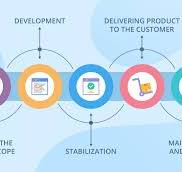The Benefits of Outsourcing Development
Outsourcing development has become a popular strategy for businesses looking to stay competitive in today’s fast-paced digital landscape. By entrusting certain aspects of software development to external partners, companies can leverage specialized expertise, reduce costs, and accelerate project timelines.
Cost Efficiency
One of the primary reasons companies choose to outsource development is cost efficiency. Outsourcing allows businesses to access a global talent pool at competitive rates, eliminating the need to hire and train in-house staff for specialized projects. This cost savings can be significant, particularly for small and medium-sized enterprises.
Access to Specialized Skills
Outsourcing development provides access to a diverse range of specialized skills that may not be available internally. Whether it’s mobile app development, web design, or data analytics, outsourcing partners bring expertise and experience that can enhance the quality and efficiency of software projects.
Flexibility and Scalability
Outsourcing development offers businesses the flexibility to scale resources up or down based on project requirements. This scalability ensures that companies can adapt to changing market conditions and respond quickly to new opportunities without the constraints of a fixed in-house team.
Accelerated Time-to-Market
By leveraging the resources and expertise of outsourcing partners, businesses can accelerate their time-to-market for new products and services. Outsourcing allows companies to streamline development processes, reduce bottlenecks, and deliver solutions faster than if they were developed solely in-house.
Risk Mitigation
Outsourcing development can help mitigate risks associated with complex software projects. External partners often have established processes and quality assurance measures in place to ensure project success. Additionally, outsourcing providers may offer service level agreements (SLAs) that provide guarantees on project delivery and performance.
In conclusion, outsourcing development offers numerous benefits for businesses looking to optimize their software projects. From cost savings and access to specialized skills to flexibility and risk mitigation, outsourcing can be a strategic solution for companies seeking competitive advantage in today’s digital economy.
Top 8 FAQs About Outsourcing Development: Understanding Benefits, Risks, and Future Trends
- What is outsourcing development?
- Why do companies outsource development?
- What are the benefits of outsourcing development?
- How can businesses find the right outsourcing partner for development projects?
- What are the risks associated with outsourcing development?
- How does outsourcing development impact project timelines and budgets?
- What types of projects are commonly outsourced for development?
- What trends are shaping the future of outsourcing in software development?
What is outsourcing development?
Outsourcing development refers to the practice of delegating software development tasks and projects to external third-party vendors or partners. This strategic approach allows businesses to leverage the expertise and resources of specialized professionals outside their organization to design, build, and maintain software applications. By outsourcing development, companies can access a broader talent pool, reduce costs, accelerate project timelines, and enhance their overall competitiveness in the rapidly evolving digital landscape.
Why do companies outsource development?
Companies outsource development for various reasons, including cost efficiency, access to specialized skills, flexibility, and accelerated time-to-market. By leveraging external partners, businesses can tap into a global talent pool at competitive rates, eliminating the need to hire and train in-house staff for specialized projects. Outsourcing also provides access to diverse expertise that may not be available internally, allowing companies to enhance the quality and efficiency of their software projects. Additionally, outsourcing offers flexibility in scaling resources based on project requirements and helps accelerate the delivery of products and services to market. Overall, companies outsource development to optimize their processes, reduce costs, and stay competitive in today’s dynamic business environment.
What are the benefits of outsourcing development?
When it comes to outsourcing development, the benefits are numerous and compelling. By outsourcing development tasks to external partners, businesses can tap into a global talent pool, access specialized skills not available in-house, and achieve cost savings through competitive rates. Additionally, outsourcing offers flexibility in scaling resources based on project needs, accelerates time-to-market for new products and services, and helps mitigate risks associated with complex software projects. Overall, the benefits of outsourcing development include increased efficiency, enhanced quality, and the ability to stay agile in a rapidly evolving digital landscape.
How can businesses find the right outsourcing partner for development projects?
When it comes to finding the right outsourcing partner for development projects, businesses should prioritize thorough research and due diligence. It is essential to assess potential partners based on their expertise, experience, and track record in relevant technology domains. Businesses should also consider factors such as cultural fit, communication capabilities, and project management processes when selecting an outsourcing partner. Seeking recommendations, reviewing case studies, and conducting interviews can help businesses identify a partner that aligns with their specific project requirements and long-term goals. Ultimately, choosing the right outsourcing partner is crucial for ensuring successful collaboration and achieving desired project outcomes.
What are the risks associated with outsourcing development?
When considering outsourcing development, it is important to be aware of the potential risks that come with this strategy. One common risk is the loss of direct control over the development process, which can lead to communication challenges and misalignment of expectations between the client and the outsourcing partner. Additionally, concerns about data security and intellectual property protection may arise when sharing sensitive information with external parties. Delays in project timelines, quality issues, and cultural differences between teams can also pose risks to the successful completion of outsourced projects. It is crucial for businesses to carefully evaluate these risks and implement strategies to mitigate them effectively when engaging in outsourcing development partnerships.
How does outsourcing development impact project timelines and budgets?
Outsourcing development can have a significant impact on project timelines and budgets. By leveraging external expertise, businesses can often expedite project delivery, leading to shorter development cycles and faster time-to-market. However, the effectiveness of outsourcing on project timelines and budgets depends on various factors such as the complexity of the project, communication efficiency with external partners, and the quality of project management. While outsourcing can help control costs by accessing cost-effective resources, poor planning or miscommunication can lead to budget overruns. Therefore, careful consideration of outsourcing strategies, clear expectations, and regular monitoring are essential to ensure that outsourcing positively influences project timelines and budgets.
What types of projects are commonly outsourced for development?
Many types of projects are commonly outsourced for development, ranging from web and mobile app development to software testing, cloud computing, and data analytics. Companies often outsource projects that require specialized skills or resources that may not be readily available in-house. Additionally, tasks such as UI/UX design, e-commerce platform development, and custom software solutions are frequently outsourced to external partners to leverage their expertise and accelerate project timelines. By outsourcing these diverse projects, businesses can access a global talent pool, reduce costs, and optimize their development processes to achieve successful outcomes.
What trends are shaping the future of outsourcing in software development?
The future of outsourcing in software development is being shaped by several key trends. One prominent trend is the increasing adoption of artificial intelligence and automation tools to streamline development processes and enhance efficiency. Another significant trend is the rise of remote work and distributed teams, allowing companies to tap into global talent pools and overcome geographical barriers. Additionally, the focus on cybersecurity and data protection is driving companies to prioritize security measures when outsourcing development tasks. Overall, these trends are reshaping the landscape of outsourcing in software development, paving the way for more agile, innovative, and secure practices in the industry.



